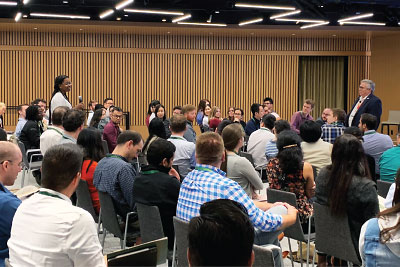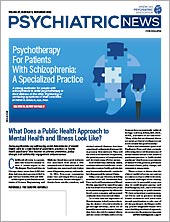The 20th century philosopher, psychologist, and educational reformer John Dewey once said: “We don’t learn from experiences—we learn from reflecting on experience.”
And this is precisely what more than 75 chief psychiatry residents from 40 programs from around the United States did when they left the 49th Chief Residents Leadership Conference (CRLC) this summer to return to their respective programs—they reflected on new experiences and insights about themselves as leaders.
Founded in 1972 as the Tarrytown Leadership Conference—so named because of its location in New York—the CRLC is known for its unconventional style of leadership training and receives high praise each year from chief resident attendees and faculty alike.
“For the past two years, these incoming chiefs have been working in overburdened health care environments as they deal with challenges related to COVID-19,” Bruce Schwartz, M.D., CRLC program director and former APA president, told Psychiatric News.
Schwartz is also professor, deputy chair, and clinical director of psychiatry and behavioral sciences at Montefiore Medical Center and the Albert Einstein College of Medicine.
He noted that one of the conference highlights for the chief residents each year has been meeting and talking in person with peers around the country who encounter the same challenges in their own departments and learning how other residents deal with them.
“If anything, COVID-19 brought home the importance of leadership,” he said. He noted that more than a few of the chief residents told stories about leaders not rising to the challenges presented by the pandemic.
Sarah Klagsbrun, M.D., served as faculty at the June meeting and found it to be a rewarding experience. She is medical director of Four Winds Hospital Westchester in New York.
She noted that one of the conference’s aims is to help residents gain insight into how they behave in relation to authority figures and how they will behave in their roles as chief residents.
“Due to the intensity of the groups during the three-day conference and the amount of time the residents spent with one another, the group members—all strangers prior to the leadership conference—connected through the experience. Over time, as trust grew within each individual group, the chief residents began reflecting out loud to the group about their interactions within the group and, by the end of the conference, how this related to their leadership qualities,” she noted.
The chief residents have a dual role of being part of the administration while also wanting to represent their fellow residents, Klagsbrun said, adding “at times these two roles will conflict.”
APA CEO and Medical Director Saul Levin, M.D., M.P.A., remarked that he also witnessed tremendous growth in the chief residents over the course of the three-day conference. “This year’s CRLC was another great success, and it makes one proud to see the future leaders of psychiatry representing leadership equality, diversity, and inclusion,” he said.
Eric A. Nelson, M.D., a PGY-3 chief resident at Albert Einstein College of Medicine/Montefiore Medical Center, told Psychiatric News that he found a couple of parallels between his experience in 2004 at the U.S. Army Ranger School (a nine-week program involving physically demanding tasks as well as food and sleep deprivation) and the CRLC.
“As I did with the CRLC, I went through ranger training with a group of other people, and I learned not only by reflecting on how I’ve dealt with my challenges but seeing how the others faced their own unique challenges,” he said. He added jokingly, “There was no food deprivation at the CRLC—in fact, the food was delicious.”
The way the chief residents gain insight at the CRLC is not dissimilar to the learning process of Daniel, otherwise known as the Karate Kid, who is learning karate from Mr. Miyagi in the film of the same name. “Daniel gets fed up with waxing a car, painting a fence, and performing what he thinks are other menial chores, until he realizes he was learning martial arts the entire time,” said Nelson. “It was the same with the conference—it was intense, but for me at least, it wasn’t until the end that it became apparent that we were learning about leadership.”
Schwartz noted that special plans are already in motion for next summer’s CRLC—its 50th anniversary—which will be held June 2 to 4, 2023. ■

